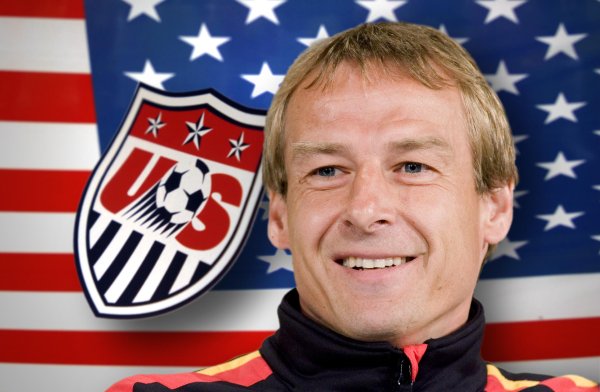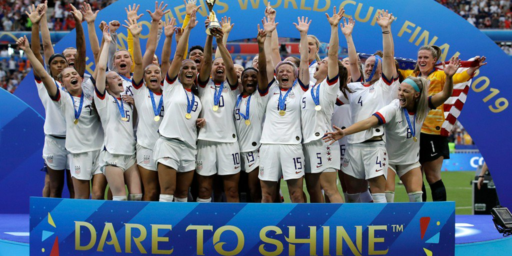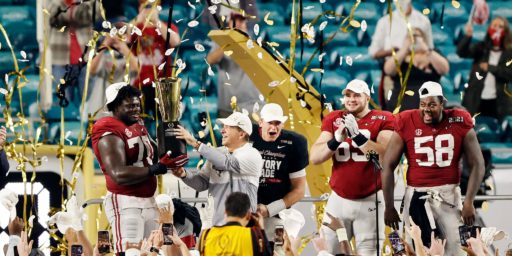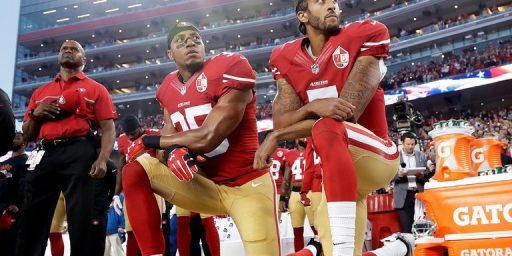Team USA, Xenophobia, and International Soccer
The former coach of an American team playing a foreign sport is upset that his foreign-born successor is using foreign-born Americans.
The former coach of an American team playing a foreign sport is upset that his foreign-born successor is using foreign-born Americans.
Reuters (“Soccer-Arena unhappy foreign-born players being picked for US“):
Former United States head coach Bruce Arena has questioned the selection of foreign-born players on the national team.
In a thinly-veiled attack on current coach Juergen Klinsmann’s selections, Arena said he wanted to see more American-born players in the squad.
“Players on the national team should be – and this is my own feeling – they should be Americans,” Arena told ESPN’s The Magazine.
“If they’re all born in other countries, I don’t think we can say we are making progress.”
Since taking charge of the U.S. team in 2011, Klinsmann, a World Cup winner with Germany in 1990, has picked several players that were born and raised in his native country but are eligible to play for the U.S. because they have an American parent.
The squad for Friday’s World Cup qualifier against Costa Rica includes two German-born players.
Midfielder Jermaine Jones was born in Frankfurt and played three internationals for his homeland before switching allegiance to his father’s country of birth.
Striker Terrence Boyd was born in Bremen and currently plays for Austrian club Rapid Vienna.
Full-backs Timmy Chandler and Fabian Johnson and midfielder Danny Williams, all German born and playing in the Bundesliga, would almost certainly have been called up for this month’s qualifiers had they not been suffering injuries and illness.
While odd on a whole lot of levels, Arenas has a point.
There’s nothing unusual about players with dual citizenship—or even players who switch citizenship solely for the purpose of playing—in international competitions, but it’s an strange practice given that the whole point of the competition is gin up nationalistic pride.
In ordinary professional sports, local allegiances have long been artificial. That is, fans will typically root for a team representing the city they currently or once lived in but the players themselves are drawn from all over the country if not the world. In the more recent era of free agency, it’s especially surreal, as players from a bitter rival may join your team the next year. But, in essence, fans are rooting for the laundry. It’s the uniforms, not the geography, that matter.
But in international competition, fans draw together to watch national teams, often hastily assembled, compete against other national teams. But Team USA is being headed by a German coach and is stocked by players whose primary loyalty is to Germany. I have no doubt that they’ll compete just as hard—if not harder—if they happen to be matched up against Germany. But isn’t something lost in the competition?







This is a fair point.
In the recently concluded World Baseball Classic, both this year and in years past, players for American MLB teams have typically played on the national team of their native country. This, along with the fact that most Major League players avoid the WBC because it interferes with Spring Training, may be why the United States has never won the World Baseball Classic
These are (I believe all) players born in Germany to American service members. Still feel the same way?
If we want to limit ourselves to only selecting American-born footballers, it’s going to be make it very difficult in the short-term to ever compete in a World Cup. And frankly, that’s all I care about right now. If a player with duel citizenship wants to put on a U.S. kit and play for America, then I will gladly accept him and cheer for him. Maybe as soccer continues to grow in this country, more money will flow into the sport and more Americans may be inspired to pursue a career in soccer and stay and play here instead of signing overseas. But until that day, I really could care less where our players were born. I will feel just as much pride (and likely just as much frustration) as I do every World Cup. If Klinsmann can make us into a factor on the world stage, then I could care less who he selects for our squad– as long as it’s in the best interests of our team and whomever we happen to be facing in a given match.
And speaking of the USMNT, reminder that there’s a qualifying match versus Costa Rica tomorrow night. Kickoff should be a little after 10 EST.
He does? He’s saying that anyone who isn’t native born can’t ever be considered truly American.
That’s outright bigotry, and frankly the idea you consider that a point bothers me.
What the hell? These players all have an American parent. They’ve been Americans since the day they were born. They’re as American as anyone. These aren’t “foreign” players. They’re American players.
@Stormy Dragon:
Especially considering that all these players HAVE AN AMERICAN FATHER!
Jones, Boyd, Chandler, Johnson and Williams, you may note, are not typical German last names….
@Rafer Janders:
Even if they didn’t, they could still be Americans. Is Arnold Schwarzenegger, living here for over 40 years now, not an American?
Were they home schooled? It’s okay if they were home schooled.
@Stormy Dragon:
I was just about to write the same thing — if Arnold were to represent the US in, say, some seniors body-building competition, would people complain he wasn’t American? It would never even cross their minds. And Schwarzenegger, unlike these men, didn’t even become an American until he was an adult. These guys were all entitled to an American passport at birth.
Obviously enough James, you have never seen the average American soccer player play against the average European (or C american, S american, or African, or Asian)
James, something is not lost in the competition, something is gained.
Really, one word: Barcelona. Another: Messi. Another: Iniesta. Another: Villa. Another: Ronaldinho…. ooopps.. wait a minute, boooooo hisssss boooooooo……
Lawrence Dallaglio played rugby for England, but was eligible to play for Ireland and Italy as well. One year before a 6 Nations match between England and Italy (in Italy) they Italians floated the story that they would pick him up at the airport so he could fulfill his mandatory military duty, which would cause him to conveniently miss the match.
Nothing ever came of it, but it was a humorous story regarding some of the pitfalls of dual citizenship.
As a follow up, I don’t think the English minded too much because he helped the team win their first and only Rugby World Cup.
Are we going to require the Green Bay Packers’ players to grow up in Wisconsin? I think this is a non-issue.
Oh, and he he “rooting for the laundry” – that’s classic….
No foreign born players on US teams. Gee whiz if I was rated 300 points higher, I might make the US Chess Olympiad team. Of the last 5 Olympiad teams, Only 1 player was born on the United States mainland. Another was born in Guam. Otherwise the SU, Armenia, Belarus, etc. Even one player was born in Japan.
Past Olympic players Reshevsky(Poland), Benko(Hungary), Mednis(Latvia), Browne(Australia), Kavalek(Czechoslovakia), Seirwan (Syria), Gulko (USSR), Dzindzichashvili(Georgia USSR) and the list goes on.
The United States Solheim Team on the other hand allows only players born in the United States to play.
President’s Cup play has seen Aaron Baddeley play for the International team. Baddeley was born in New Hampshire but his family moved to Australia when he was 2.
For obvious reasons, given its demographics, on political internet blogs, they’ll miss the whole point. Badly. C’est la vie.
Speaking of which, the real irony of Klinsmann’s tenure thus far is that he was supposed to be the guy who put the finishing touches on the development of the grass roots of U.S. soccer. From the ground up. The next generation of home grown players. Sure as hell doesn’t look as though that will occur. Sad, that is. Baffling.
Years ago this sort of issue came up concerning the Indianapolis 500, of all places. Over the years there were more drivers from other countries and the more cars from other countries (Honda, Toyota, Mercedes). This created a concern in the Indy racing organization to get things back to more American. There was a move by the Indy racing organization to get more stock motors in the cars (this was also to cut back on the high price of these racing cars). I remember that this led to General Motors getting into this after Ford had raced at Indy in the mid ’60’s. GM came in with some very powerful Buick motors but couldn’t get them to hold up for 500 miles, even though they were fast.
Chevrolet came in soon after and had a lot of success, then Oldsmobile based engines were used, of all things. Then there was a big spit in the Indy teams, creating the IRL and another organization. The Indy 500 is still a great event, but not like it was with the Unsers, Foyt, Sullivan, Johnny Rutherford, and Andretti’s. Things change, and NASCAR become more nationwide, but lately they have had their problems.
USA! USA! USA!
So long as the US teams wins, no one will give a fig — imported or domestic– where the players come from.
Something was lost in the competition when the various governing agencies decided that it was ok to be a (~n openly) professional player. But was does it matter in the long run as long as the peeps can shout U S A?
Fitzgerald was an drunky moron: there are second acts in American lives.
Ted Shackelford from Knots Landing now coaches the national soccer team!
Very disappointing remarks by Bruce Arena. Seriously, he needs to rethink this “issue.” He needs to catch up with the rest of the world on this. Is he seeking some kind of purity that does not exist? These are Americans, not foreigners.
Look across the Atlantic to Europe, and check the national teams in Europe sometime. In France, in Germany, in Great Britain, the Netherlands – it’s not what many people imagine it to be. There are players of all kinds of mixed ethnicity and backgrounds on those teams.
My wife was not born in America, and her mother was a foreign national at the time of her birth. On the other hand, her dad was in the Army, is a decorated combat vet, and taught at West Point.
But I guess she is not a real American to Republicans.
(you should hear my mother in law, now a naturalized citizen, tee off on anyone who knocks America)
@al-Ameda:
More or less. Most of the players with Caribbean and Maghrebin descent on the French team were born in France and Caribbean and Maghrebin culture is today part of the French Culture. American conservatives can whine all they want, but a Muslim or a Caribbean can be as French as Camembert cheese.
Arenas has a point. He is not complaining about a team that has nonwhite players or players that were not born in the US. He is talking about players that were either not raised in the US or do not live in the US. If the US wants to have a competitive World Cup team it needs to nurture produce it´s own players. It´s one thing to convince one or another player to immigrate, but you need to have a strong base.
I think James is letting his prejudices slip a bit. If James had bothered to check the Wikipedia entry for Jermaine Jones for example, he would have learned that his father was as US service member and his mother a German national who married when his father was stationed overseas and that after his birth, he had lived in Chicago and Mississippi before his parents divorce when he moved back to Germany with his mother. Is James going to tell me that he is NOT American? As Mark Jones stated above, all (or nearly all) of these men are the children of US service member fathers and German mothers who met while they were serving in Germany. And like Jermaine Jones, if you read many of their stories, you will find that they have more connections to the US than you James or Bruce Arena would otherwise have you believe. For example, Terrence Boyd had also lived in the US with his father and mother before their divorce and her moving back to Germany as well and ESPN wrote a very heart rendering story of him reuniting his his biological father to get his US passport that I seriously recommend any USMNT fan to read.
But I think that the fatal flaw in Arena’s and James’s thesis here is that somehow where you are born makes a significant difference in all of this. It really doesn’t and if James needs more proof, here is some additional context in the world of international football.
Lionel Messi, who many say is the greatest footballer ever, moved from Argentina to Barcelona, Spain when he was 9 to enroll in Barcelona’s academy “La Masia”. Yet still, he represents Argentina today despite the fact that he spent his formative years and all of his adult life in Barcelona, Spain and not Argentina.
The 2nd best (the best is obviously Pirlo) Italian footballer is named Mario Balotelli. He was born in Ghana and adopted by an Italian family. Many Italians shamefully don’t recognize him as Italian and he has had bananas thrown at him and racist chants directed towards him. But he is Italian all the same, as that is all he knows. He certainly can only speak Italian (and some awful English) and could never speak even a simple word of Twi. But according to James, he should represent Ghana because he was born there.
In contrast, there is also the curious case of the Boateng brothers, both born of a Ghanian father and I believe different German mothers. Despite both being born and raised in Germany, Kevin-Prince Boateng (who plays for AC Milan) has decided to represent Ghana internatioanally, while his brother Jerome Boateng (who plays for Bayern Munich) had decided to represent Germany. Both played for Germany up through the U21 level.
Similarly to Kevin-Prince Boateng, there is a young right back who plays for Arsenal by the name of Carl Jenkinson, who has a Finnish mother and a English father. He grew up in England, yet represented Finland in international competitions up through U21. After he signed for Arsenal and showed some promise, he was called up by the England National Team and he decided to represent England. He is not a world class player and may never be called up for England again, however he is now tied to England and will never be able to represent Finland again.
We could also talk about all the Mexican players who are not truly Mexican, like the Dos Santos brothers for example.
These types of stories are not new or unique, unless of course your name is James Joyner and you like to ply your trade in xenophobia.
@Mark Jones: Heh, it’s a time-honored tradition to knock up the locals!
Dear Bruce Arena, remember a player named Earnie Stewart? You may have forgotten, but he did play on the US National team for a number of years, including quite a few under your watch. His place of birth? The Netherlands. Hmm…
Are any Kenyans involved in this?
@Brandon: Thanks for all these interesting facts. I suspected the dual nationals Klismann chose had such histories. You added the context of other countries which shows our situation isn’t unique and such cases are common even in countries with strong soccer cultures.
I would add that there is no incompatibility between hiring dual nationals and developing home grown talent.. The latter will first go through the different levels of international junior tournaments before being eligible for the main team. In the process they will gain experience from these seasoned professionals.
@Mark Jones: Not necessarily, although I gather from the rest of the commentary that several of the players in question are less “foreign” than Arenas makes out. If a service member impregnates a local but the kid grows up in Germany as a German, then I’m not sure in what other than a technical sense he’s an American. His loyalties are to Germany.
@OzarkHillbilly: But the regular professional teams in Europe are in the same category as, say, the Dallas Cowboys or New York Yankees. As discussed in the post, they’re cases where people are rooting for the team name without much real local attachment. National teams are theoretically different.
@anjin-san: @Stormy Dragon: My mother was a German citizen when I was born. I’m not arguing against naturalization. I’m arguing against players with primary loyalties to one country playing for another country simply because they couldn’t make their home country’s team. There’s an American girl playing on the Russian basketball team, for example. I don’t begrudge her filling her dream to play in the Olympics, so think the animus against her is misplaced. (And I don’t have any animus against these German-American players on Team USA.) But I think it’s a little weird given the jingoistic nature of the competition.
This happens all the time in all sorts of sports. It happens often for the Olympics and often works the other way. There are quite a few dual citizens who lived and grew up in the US but play for different countries, because they have a better chance of making that national team.
If a player has ciitizenship and meets the qualifications to play for a country, then they should be allowed to play.
Giuseppi Rossi was born in New Jersey, is one of the stars of the Italian national team at CF.. and nobody has complained about his foreign birth.
Neven Subotić played for the US U-17 and U-20 clubs, but currently plays for Serbia. Borussia Dortmund rejected an $18M offer for him from Chelsea in 2010.
Arena’s statement is truly bizarre, and shows why he should not be considered for international duty.
I like it–the US team in parroting the American way. “If you can’t beat ’em…co-opt them!” USA! USA! USA! USA!
@James Joyner:
That might be a valid point, but that’s not the point Arena was making.
More than a little odd from the guy who voted for John McCain AND the Bush/Cheney ticket.
But hey, that’s just a trivial thing. And of course there’s nothing “jingoistic” about a presidential election.
in fact, in many countries, players that were born and lived most of their lives in their birth countries, but that plays for foreign leagues are always an issue. In Brazil they were were called “Foreign League”, some trainers were criticized for picking a high number of these players. Some people thinks that it´s harder to assimilate them on a team.
US soccer obviously needs home grown talent to be competitive, and I think that´s an issue that Arenas is raising.
in fact, in many countries, players that were born and lived most of their lives in their birth countries, but that plays for foreign leagues are always an issue. In Brazil they were were called “Foreign Legion”, some trainers were criticized for picking a high number of these players. Some people thinks that it´s harder to assimilate them on a team.
US soccer obviously needs home grown talent to be competitive, and I think that´s an issue that Arenas is raising.
In regards to James Joyner:
It is no problem for a jingoistic fan if a player may not identify primarily with the nation he plays for, as long as his team wins. If we can kick out our Italian nemesis and show the up-start Spanish their place, I don’t care which country a player considers his “real” home, as long as he helps the German team achieve these goals.
@ James
My understanding is that these guys were American citizens at birth.
@anjin-san: I don’t know much about the players in question. I gather that they were born in Germany and grew up there with their German mothers, played soccer in the German system, and so forth. But I’m really using Arena’s comments as a jumping off point for a larger phenomenon. In many cases, the athletes have essentially no tie to the country they’re playing for, switching citizenship solely for the purpose of making the squad.
@James Joyner:
James,
Your understanding isn’t exactly correct here. At least two players, Terence Boyd and Jermaine Jones both spent significant amounts of time in the US as children, moving back to Germany after their parents divorced.
Additionally, Timmy Chandler joined the US team before Klinsmann came on board. While he went back and forth on his decision, he finally decided to stick it out with the Red, White and Blue.
You would find it amusing that the talent flows both ways. Italy’s great (oft-injured) hope is Guiseppe Rossi, who hails from that province of Italy known as New Jersey. The number of Mexican youth national team players actually born in the United States is non-trivial and continues to grow, to the point where Mexican fans have the same grumblings about “non-natives” taking spots.
You talk about players switching citizenship. That’s simply not happening here. All of these players have multiple eligibilities, and are choosing one. It’s not like any of these players gave up German citizenship for American citizenship. They were born, and remain, dual citizens.
One final note, John O’Brien moved from LA to Amersterdam at the age 14 to play for Ajax, not returning to the US until his playing days were nearly done. Did he somehow become less of an American?
Oh, great, the worst part of European soccer is coming to the US. Sigh. I guess that means we’re advancing as a soccer nation? /sarcasm
Arena is participating in a tradition of prejudice that is as old as the international game itself. “Is our national team sufficiently pure?” To which the answer usually is: you are an idiot. Which Arena is here.
I cannot tell you how small it makes you look when you complain that your French squad filled with people who immigrated to France as children from a Francophone part of the world isn’t sufficiently FRENCH. Really?!?!?
On a lighter note: egads, Messi could claim to be Spanish? I’m glad he didn’t, because the Spanish national team is pretty much the dominant Barcelona team minus Messi. And they’ve won the last few major international tournaments they’ve been in. A Spanish team WITH Messi would be scary!
(And I believe that, having spent many years in Spain, Messi would have the right to join that Spanish team under the well understood rules of this kind of thing.)
@James Joyner:
Oh, if only there had been some way for you to learn more about the players before writing your post! But, alas, we lack such an easily accessible research tool.
You gather wrong. Several of the players also grew up in the US, and, no matter what, have American fathers, so have are quite simply Americans as well as being German.
Meanwhile, let’s look at some of the stars of the German national team such as Mesut Ozil (grandparents from Turkey), Jerome Boateng (father from Ghana, German mother), Sami Khedira (Tunisian father, German mother), and Mario Gomez (Spanish father, German mother). Germans certainly aren’t complaining that these men are playing for Germany rather than Turkey, Ghana, Tunisia or Spain.
@James Joyner:
What is a “technical American”? He’s entitled to an American passport. He’s an American citizen, he can vote in US elections, he pays US taxes, he can live in the US, he has all of the rights and responsibilities of citizenship. What’s technical about that?
How on earth do you know where his loyalties are? Maybe he prefers his father to his mother. Maybe he’s been yearning to move back to the States his whole life. Or maybe not. You simply have no way to know.
@Rafer Janders:
Jermaine Jones was on the German National Under 21 team in 2001 and the German National Team in 2008, so I don’t think it’s a stretch to argue that his loyalties were with that country until he discovered he couldn’t make the cut and that his sudden interest in the US is rather mercenary in nature.
Again, if Arena had said “membership on the US team should be restricted to players with a history of loyalty to the US soccer program, and I don’t think Jermaine Jones has demostrated any such loyalty”, that would have been perfectly fine. The problem is that isn’t what he said.
@Stormy Dragon:
But he doesn’t have a “sudden interest in the US.” His father is American — he’s had a “sudden” interest in the US since the day he was born. Half his family, half his heritage, is American. There’s nothing mercenary about playing on an American team is you yourself are American and if your father is American.
Just because you’re a loyal German citizen doesn’t also mean you can’t be a loyal American citizen — that is, after all, what dual nationality entails.
Again, there’s no such thing as “half a citizen.” You’re either an American citizen, with 100% of the rights and responsibilities of citizenship, or your’e not. These men are all American citizens just as much as any other American.